- Home
- Will McIntosh
The Future Will Be BS Free Page 17
The Future Will Be BS Free Read online
Page 17
They left the TV on. I watched crowds grow outside the gates until there was no more room. Helicopters buzzed overhead, dropping tear gas, itch gas, sweeping the crowd with heat cannons, but even if the crowd wanted to leave, there was nowhere to go, because more people kept pouring in.
* * *
—
My throat was so dry I couldn’t swallow. My bladder ached. Maybe it was time to let go and wet myself. In another hour I wouldn’t have a choice.
Should I shout for help? It seemed like a bad idea to draw attention to myself. Better they forget about me. No one had passed in the hallway for what seemed like hours; I was beginning to suspect the building had been evacuated, maybe by helicopter.
On the screen, the front gates finally burst open. People poured onto the grounds, like sand pouring through the neck of an hourglass.
I listened, my ears throbbing in time with my heart.
There was a distant, muffled crash.
Someone shouted, “Come on!”
“Hey,” I cried, not entirely sure how loud I was calling. “Help!”
More crashes. Two guys ran past the door.
“Wait!”
Five or six more people passed. I called again. This time a face appeared—a guy with a wispy mustache and wearing a ski cap.
“Can you unstrap me?”
He gave me a big, friendly smile. “No problem, cousin.”
When he figured out how the restraints worked and pulled the first strap loose, I had to fight back tears of relief.
“What’d you do to end up here?” he asked.
“I invented the truth app.”
His face lit up. “Seriously?” He loosened the other strap, then offered me his hand. “In that case, it’s an honor to set you free.”
I shook his hand.
“Hey, do you have any of those things on you? Can you set me up?”
“Sorry, I don’t.” The guy looked crestfallen. “If you give me your contact info, I’ll send you one.”
Brightening considerably, he emailed me his address. His phone was still working. I was about jumping out of my skin I was so desperate to find Mom and Boob. I thanked him again, then ran off down the hall.
People were making noise on the floors above, but only a few were on this level. Most of the doors were locked.
“Mom? Boob?”
A faraway voice called, “Sam.”
I picked up my pace. “Boob?”
I turned a corner, and there he was.
We came together in a hug. “I didn’t crack,” Boob said. “I didn’t tell them anything.”
“I knew you wouldn’t. I never had a doubt.” I gestured down the hall. “She’s here somewhere. I saw her on the TV.” At least I thought I had. It could have been old footage, or computer generated.
Three people passed, each carrying a box of what looked like food.
“Ms. Gregorious?” Boob called.
We found a stairwell and headed down. The level below was uglier—bare concrete floors and walls.
“Mom?” I called. We waited, silent except for our labored breathing.
Boob tapped me. “I heard…something. It could have been a voice.”
I hadn’t, but that wasn’t surprising, given the state of my hearing. As we headed down the hall, I called again.
“There it is again. Ms. Gregorious?” Boob called.
Light leaked from a door cracked slightly open halfway down the hall. I raced to it, pushed the door open.
Mom was strapped to a chair, blindfolded, the force feeder still in her mouth.
“We’re here, Mom. It’s over.” I touched her shoulder, then, as gently as I could, I withdrew the force feeder. There was a tube on the other end that must have gone straight into her stomach. Mom gagged as I pulled it free. I undid the blindfold while Basquiat released her hands.
Although I’d been talking in a low, soothing voice the whole time, Mom still seemed shocked to see me.
“Sam?” Her voice was a horrible croak.
“We got her, Mom. We took down the president.”
Mom nodded. “Is she dead?”
“I don’t think so.”
“She’s going to be.”
I lifted Mom from the chair while Boob retrieved her legs from the floor.
“Is everyone safe?” Mom asked as we rested before heading up the stairwell.
“Everyone’s fine. You saved us, Mom.”
The ground floor was packed with people, mostly young men hooting and dancing around. The place was trashed, the walls already covered with graffiti.
“Make way, please. Injured person,” Boob called every few seconds.
People turned to stare at Mom, to pat my back as I passed, a few calling my name, evidently recognizing me from TV.
People were milling around on the lawn, not sure what to do now. Others were lining up bodies by the gates.
“Sam.”
I stopped, looked around. “Molly?” I didn’t see her.
Then I spotted Beltane, threading her way toward us, rifle pointed in the air, leading a group through the crowd: Molly, Kelsey, three more bionically enhanced vets carrying rifles. Mr. Chambliss had been busy.
Beltane took Mom from me, handed her to a vet I didn’t know. Molly hugged me fiercely. “Are you okay?”
I nodded. Molly grinned and said, “You did it. You really did it.”
“Where is Vitnik?”
“There’s a bunker where the president’s supposed to be taken in case of a nuclear attack. People think she’s there.”
Beltane grasped my upper arm to get my attention. It was hard to miss how strong and firm those fingers were, how easily they could snap your bones. “We’re going to move out fast, Napoleon. Sooner or later, the army’s going to turn up and clear this place out.”
Molly said something I couldn’t hear.
“You have to speak up. They hurt my ears.”
“Mott is setting up a production facility.”
“A production facility,” I echoed as we jogged after Beltane.
“Out of the way. Move. Move!” Beltane barked at the people blocking our way. They parted like the Red Sea. Who wouldn’t get out of the way for a group of armed vets with operational bionic parts? It was not a sight you saw every day.
The crowd thinned as we got farther from the White House. Store windows were smashed. People were carrying looted food, clothes, electronics. Not just young people—parents trailed by kids also rushed along hauling stuff. We passed a police cruiser that had backed through the window of an electronics store. The officers were loading up the trunk.
Beltane led us to a school bus parked halfway on a sidewalk alongside a row of apartment buildings. Two vehicles lay on their sides, and a third was upside down, evidently shoved out of the way by vets to make room for the bus.
As soon as we were moving, Molly, Basquiat, and I huddled around Mom, who was lying across a seat and wrapped in a blanket. In the seat behind hers, Rebe sat with her arms wrapped around Boob.
I choked up as I looked into Mom’s face. She didn’t seem to see us.
“Mom?” I said. “Is there anything you need?”
Her eyes focused. She looked from me to Molly to Basquiat. I thought she might smile when she recognized Basquiat, but her scowl never wavered.
“Find Vitnik.” The focus went out of her eyes, and she was gone again.
“Relax. The army’s not coming,” Beltane called up to Kelsey, who was driving. She was looking at her phone.
Kelsey turned in the driver’s seat. “Why not?”
Beltane expanded her phone’s screen and played a clip of an interview with a slim, gray-haired woman in a military dress uniform who was responding to a question from a journalist.
�
��As soon as we establish who is commander in chief of the U.S. military forces, I will carry out his or her directives. I will not take orders from a traitor.”
Beltane closed the screen. “That’s General Alante Austin, chairwoman of the Joint Chiefs of Staff. Vitnik is cooked.”
A ragged cheer broke out. It hurt my ears, but I didn’t mind.
I woke when the bus’s engine downshifted from a rumble to a mutter. We were cruising along an industrial road lined with cyclone fencing.
“Where are we?” I asked.
“Jersey. Outside Trenton.” My hearing was a little better. Molly didn’t sound as muffled.
We pulled into a huge, empty parking lot with a long, flat factory at the far end.
“Mott rented this for us?”
“Everyone wants a truth app,” Basquiat said. “Instead of worrying about someone trying to stop us, we have to worry about people trying to steal apps.”
I spotted at least six armed vets patrolling the grounds, and three more on the roof. And those were just the ones in sight. “Anyone coming here to rob us better come in a tank.”
Inside, people were rushing around a factory floor lined with rows of heavy machinery. Not enough people by a long shot, but it was a start.
Mott, who was talking to a guy in blue coveralls, spotted us and headed over.
“Where’s your slingshot, David?” she called out, grinning.
It took me a minute to get the reference. I held up my hand, wiggled the fingers with the truth app rings on them. “Right here.”
“That reminds me—I need one of those, and I need someone to train a couple of my people on how to use them.” Mott joined us. “I’m all in on Chambliss’s idea of hiring vets to work the factory, but I still want to make sure we don’t let any bad element through.” She pointed to a glass wall twenty feet above the factory floor. “We’ll set up a bunkhouse up there with cubicles for a little privacy. Install showers. Kitchen.” She put her hands on her wide hips. “Good food. Steak and seafood. These are vets. We treat them right, pay them damned well.”
Vets. I loved it. I put a hand on Mott’s shoulder. “I’m happy to leave business operations to you while we focus on getting the factory up and running.”
“Those should help you.” Mott pointed toward the far wall, where crates were stacked four high from one end of the floor to the other. “3-D printers.”
There were dozens of them. Big ones—industrial-grade. “Oh my goodness.” This was beautiful. We were finally going to get the truth app out there in numbers that mattered. Soon all the people who’d got where they were by lying would come tumbling down. Every crooked politician and CEO, every killer who’d gotten away with murder would be exposed.
There was a big board mounted on the wall above the printers. On it were two rows of names. Mom’s name was at the top, beside Emma Marshall’s. I recognized that name: she was the vet we’d dug up to get Mom new legs. So the board was a remembrance of the vets who’d made this all possible. My guess was it had been Mr. Chambliss’s idea. I was glad to see he’d been keeping track.
I looked around. “Where’s my mom?”
“They set up one of the offices as a room for her,” Molly said.
I headed off to find her.
She was sitting in a big stuffed chair, facing a window that looked out on the parking lot.
“Do you want to be alone?” I asked.
Mom looked up. I couldn’t get over the sense that she was blind, the way she struggled to find me.
“I don’t know what to do to help you. I’m so sorry I got us into this. I didn’t know,” I said.
“It’s not your fault.” Mom sounded out of breath, like it took everything she had to form the words. “I’m the one who screwed up.” She looked at the floor. “When I got to that town in Virginia and checked into a room, I was so filthy, and the shower was right there. I felt guilty, but I did it anyway—I took a shower. And then I went out to get something to eat….” She shook her head. “I forgot to reapply the damned liquid skin, I was so tired.”
I’d been wondering how they found her, but I hadn’t wanted to ask. “We’ve all made mistakes along the way, Mom. When I’ve got some time, I’ll write up a list of mine. I’m going to need a lot of paper.”
Mom didn’t respond.
“What can I do? I don’t know what to do to help you.”
“I’m supposed to be the one taking care of you. I’m the mom. You’re the kid.”
“You have been. I’d be dead three times over if it wasn’t for you.”
She didn’t answer. I kissed her on the cheek. “I love you, Mom.” I left her staring into the parking lot, although I didn’t think she could actually see it.
“You were right,” Mom said as I was closing the door.
I paused. “When was that?”
“When I didn’t want you to sell your shoes. You said I wasn’t taking you seriously. I wasn’t. My little boy, thinking he could start his own company.”
“And it turned out I couldn’t. Not without your help.” I eased the door closed, afraid the sound would startle her. I turned to find Mr. Chambliss heading toward me.
“How is she?”
“Not good. It’s like she’s not all there.”
Mr. Chambliss nodded. “The trauma she went through dredges up all the old war trauma. Maybe I can help. Sometimes it’s easier to talk to someone who’s been there.”
Mr. Chambliss rapped lightly on the door as I headed off to see what I could do to be useful.
“Oh. My. God.” Rebe looked up from her screen, a cheesesteak in her free hand. “Take a guess what they’re selling for on BidBuy.”
It hadn’t even occurred to me that people would be reselling truth apps this soon. We were making it as hard as possible for people to buy more than one, but I guess there were always ways to game the system.
“Eight thousand?” We were selling them for four, although even that amount was offset by the ones we sold at cost in poor communities. That had been one of Theo’s ideas, months ago, to level the playing field. At the time I’d thought he was out of his mind.
“Try forty.”
“What?” I sprang up. Rebe expanded her screen and scrolled down sales figures. Forty thousand dollars, give or take. No wonder people were selling them.
“The price will come down as more hit the market. Supply and demand,” Rebe said. “Right now, truth apps are the status symbol. Oh, and I found yet another factory making knockoffs. That makes six.”
“Good.” We should have expected people would reverse engineer truth apps and start manufacturing them. I didn’t care. I wanted as many out there as possible. “Let’s release the plans on an open-source forum. Let’s give them away.”
Rebe raised her eyebrows. “You’re getting hard-core, you know that? You’re turning into Theo.”
Her words startled me. I was, wasn’t I? When all this started, I thought Theo’s ideas were strange and eccentric. To me, the way he’d seemed to care about strangers in the Sudan as much as his own mother had been endearing and vaguely admirable, yet also tiresome and unrealistic. Not anymore.
I would have given anything to talk to Theo for five minutes, to tell him that I got it now, that I understood what he’d been saying. The four of us making tons of money was meaningless when compared with the chance to make things better for a billion people.
“I wish Theo was here to see this,” I said.
“I know. I miss that dork every day.”
“Hey, boss.” I looked down. Beltane was looking up at me from the factory floor. “We’re buying a helicopter.”
“Okay.”
Beltane shrugged. “Okay.” She wandered off.
We were buying a helicopter. Unbelievable. We had a security force of thirteen repaired vets, a bunc
h of weapons, bulletproof clothing, and now a helicopter.
“Wow. Another bank went under,” Rebe said.
“Good.” Let the rich come tumbling down. Just as Theo had predicted, powerful people—and powerful corporations—had already been brought down by a new breed of guerrilla journalists packing truth apps. And that was with less than a few million truth apps out there. Wait until there were half a billion.
Of course, it cut both ways—a lot of corporations were requiring employees to take a truth app screening to keep their jobs, and they were laying off a decent percentage of their workforce. And it wasn’t like the people who got laid off could find another job, because they were damaged goods—thieves, embezzlers, liars—and all you needed was a truth app to know that.
Rebe’s phone rang. She spoke for a few moments, then turned to me. “Roshanna Lupe at News America wants to interview us.”
I barked a laugh, then saw that Rebe wasn’t smiling.
She held out her phone. “You want to talk to her?”
* * *
—
“Here.” Basquiat pulled a tissue from my pocket and dabbed sweat off Molly’s forehead.
“I think that’s a good background,” Rebe was saying to Mr. Chambliss, who nodded.
I looked past Molly at the factory floor below, bustling with activity, machinery humming, then put a hand on her shoulder. “Boob and Rebe will be monitoring the live feed, watching for shenanigans. If they alter anything—the background, one syllable you utter, the color of your shirt—I’ll signal to you. Inform Roshanna Lupe that the interview is over because they violated the agreement, and cut the feed. Got it?”
Molly nodded as Basquiat got behind her and massaged her neck and shoulders.
“This is our chance to set the record straight with all the people who get their news from News America,” I said.
Rebe’s phone rang, sending a thrill of terror and excitement through me.
“Yes. Molly’s ready.” Rebe expanded the screen to the max. Roshanna Lupe was sitting in a director’s chair in front of an American flag.

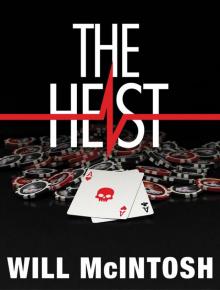 The Heist
The Heist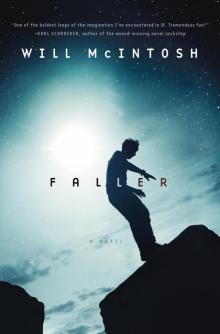 Faller
Faller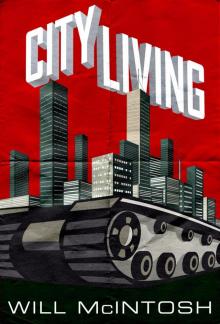 City Living
City Living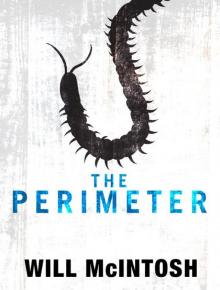 The Perimeter
The Perimeter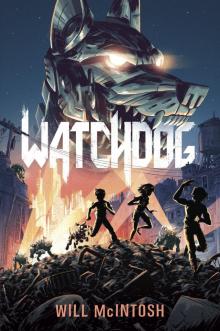 Watchdog
Watchdog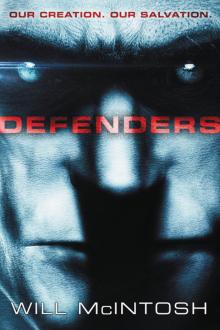 Defenders
Defenders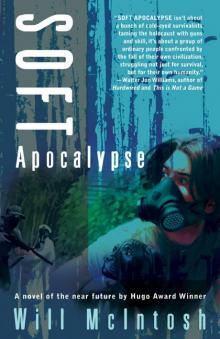 Soft Apocalypse
Soft Apocalypse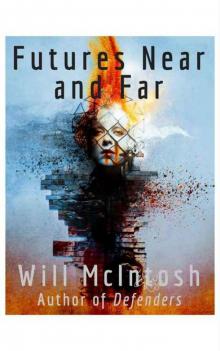 Futures Near and Far
Futures Near and Far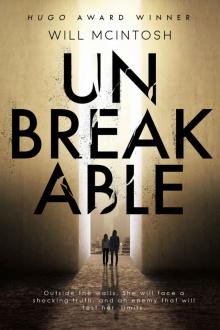 Unbreakable
Unbreakable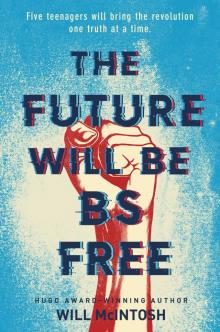 The Future Will Be BS Free
The Future Will Be BS Free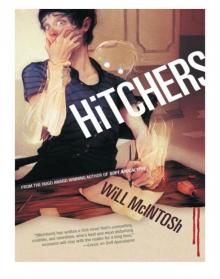 Hitchers
Hitchers Burning Midnight
Burning Midnight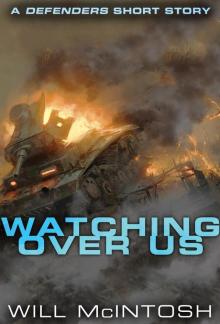 Watching Over Us
Watching Over Us